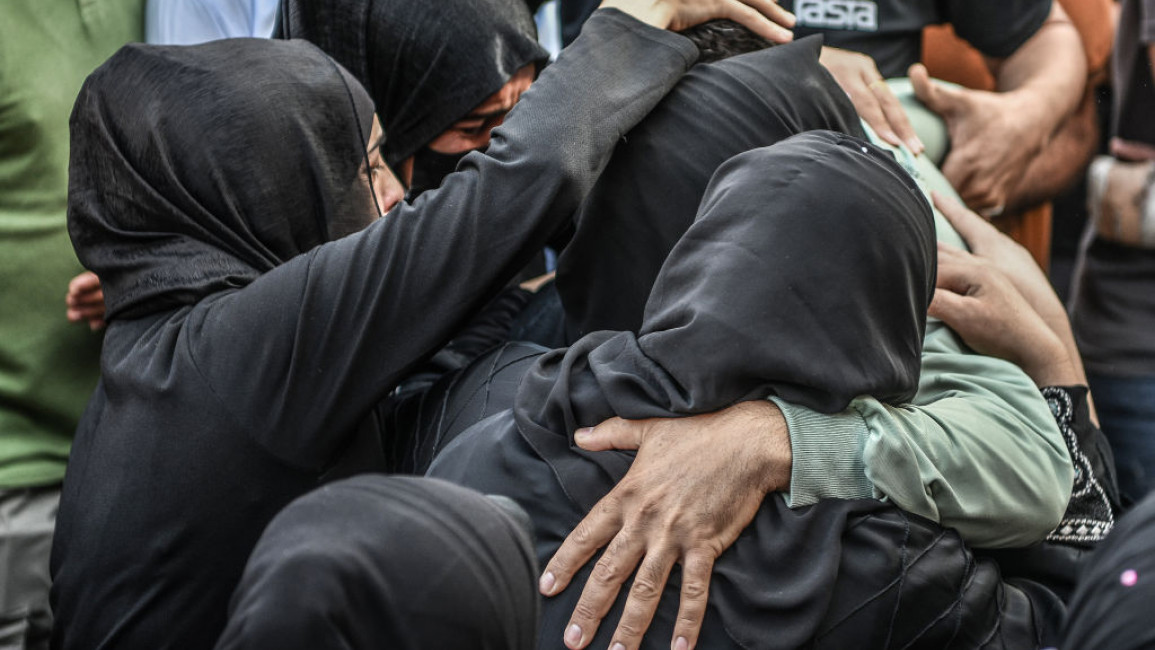As Israel's indiscriminate attacks continue, there is little time to bury the dead in Gaza
For 27 days and counting, Israel continued to indiscriminately attack the besieged Gaza Strip, killing over 9,000 people, mainly women and children.
More than 2.3 million Palestinians in Gaza face the spectre of death every day, as massacres by Israel of defenceless civilians persist without impunity. No one in the besieged coastal enclave is immune from death, and there is little hope for survival at this point.
Due to continuous, violent Israeli bombing, Palestinians in Gaza have come to hate the night due to the roar of warplanes above and the subsequent sound of massive explosions, without being able to know where has been hit amid the pitch black darkness because Israel cut off electricity.
"Because of the nature of the unrestrained attacks by Israel on our area in Tal al-Hawa in Gaza City, I can't tell you if what is being targeted are residential or military sites, "Mohammed Tayeh, a Gaza-based resident, remarked to The New Arab.
"I was truly shocked. The neighbourhood in which I used to live safely and peacefully has turned into a pile of rubble, and all the houses have become mere ruins, burying my neighbours and friends under them," he said, his voice quivering with emotion.
"I rushed with my friends to the bombing sites to check on our neighbours. Dozens of them had died. Among them were doctors, engineers, teachers, university students, and others... They were alive, and suddenly they became today just a memory, buried under the dirt," he added.
After a long and arduous day, Tayeh and several of his neighbours were able to help civil defence crews retrieve the dead, whom many now call martyrs, and any living wounded from under the rubble.
He tried to fall asleep on a bed at Al-Quds Hospital in the same neighbourhood, hoping to find some rest and sleep. But before he could close his eyes, one of his relatives called and informed him that his grandfather's house in the central area of the Gaza Strip had been entirely destroyed by an Israeli strike, killing 35 members of his family, including women, children and the elderly.
"It was like a nightmare. I have lost my family. My grandfather's house and everyone in it no longer exists, and we will not be able to meet in my grandfather's house and exchange conversations, laughter, and jokes with my cousins and uncles. I have lost my life. Israel has turned Gaza into hell, and nothing is worth living for," the grieving man said.
Tayeh's tragedy did not end. Two days after the death of his relatives, he completely lost his home in another Israeli attack on his area.
He is now homeless with his family, sheltering in one of the UNRWA schools in the Nuseirat camp in the middle of the Gaza Strip, with thousands of displaced families united by similar catastrophes.
Inside the crowded school with displaced people, Tayeh met several new friends, including Mustafa Abu Shamala, who fled to the school after losing 25 members of his family in an Israeli bombing in the northern Gaza Strip.
"I thought I was the luckiest after I lost my family, and only I and two of my children remain alive. But when I came here after we left the hospital, I realized that thousands of tragic stories are like my tragedy," Abu Shamala said to TNA.
"All of us here can hardly console ourselves or even be able to console each other. Life has become difficult and heavy, and we cannot bear the amount of tragedies, destruction, and wounds imposed on us without any warning," the 42-year-old father of six said to TNA.
Mona Al-Aidi, a Khan Younis-based young woman, was unable to say goodbye to her family, consisting of 48 members, all of whom were killed due to an Israeli raid that targeted their home in the city of Rafah, south of the Gaza Strip.
"Since the beginning of the current Israeli war, I thought that I would die at any moment because of the continuous bombing of the city of Khan Yunis, where I live, but I never expected that I would lose my family and be alone in this world," she said.
She noted she was not able to host a funeral for her family, whom she will never see again, nor be able to plant a kiss on their foreheads." I don't know what their bodies looked like. Were they body parts, or did they keep their bodies? Was death more merciful to them than living in fear all the time because of the brutal Israeli bombing?" she wondered.
In just three weeks, the Israeli occupation forces committed wiped out at least 881 multi-generational families. So far, more than 9,061 Palestinians have been killed by Israel, including 3,760 children, 2,326 women, and 460 elderly, since 7 October.
For its part, the government media office in Gaza said that the Israeli army dropped at least 10,000 bombs since the start of its attacks on the Gaza Strip and estimated that the number of explosives dropped exceeds 25,000 tons, amounting to about 70 tons per square kilometre.



